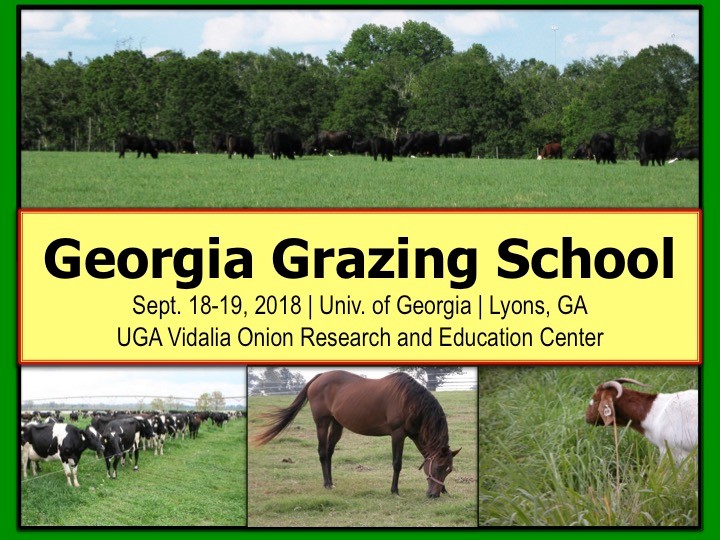UGA Extension will host a two-day Advanced Grazing School on September 18-19, 2018 that will provide attendees with a deeper understanding of two key aspects of their grazing systems. The focus areas will be on choosing the right pasture species, designing a grazing system that works best for your operation, and how to profitably fertilize pastures for optimal performance. Training will take place in both classroom and field settings, with several hands-on learning experiences geared toward these areas of focus. The classroom portion of the course will be held at the Vidalia Onion Research and Extension Center in Lyons, GA. Then on the second day, the group will finish up the classroom portion before visiting Newly Halter’s farm where participants will take a close look at his rotational grazing systems.
2018 Grazing School
September 18-19, 2018 | UGA Vidalia Onion Research and Education Center | Lyons, GA
UGA Extension will host a two-day Advanced Grazing School on September 18-19, 2018 that will provide attendees with a deeper understanding of two key aspects of their grazing systems. The focus areas will be on choosing the right pasture species, designing a grazing system that works best for your operation, and how to profitably fertilize pastures for optimal performance. Training will take place in both classroom and field settings, with several hands-on learning experiences geared toward these areas of focus. The classroom portion of the course will be held at the Vidalia Onion Research and Extension Center in Lyons, GA. Then on the second day, the group will finish up the classroom portion before visiting Newly Halter’s farm where participants will take a close look at his rotational grazing systems.
Topics to be Discussed
- Manipulating forage growth and grazing behavior
- Southern Forages: Forage yield, distribution, and quality
- Optimizing the size, number, and layout of your paddocks
- Sketching out the Ideal: Planning the grazing system
- Importance of taking a good forage sample
- Matching forages with livestock needs
- Supplementation options and limitations
- Weed management strategies in grazed pastures
- Winter annual species and variety selection
- Data review: Animal performance on winter annual forages
- Summer annual species and variety selection
- Data review: Animal performance on summer annual forages
- How to use soil testing and plant tissue analyses in grazing systems
- Nutrient distributionand tactics to manage grazing behavior
- Lime and fertilizer options available to pasture managers
- Benefits and limitations of using poultry litter in grazing systems
- Bahiagrass or bermudagrass? What makes the most economic sense?
- Review of bahiagrass and bermudagrass varieties
- Bermudagrass stem maggot management
- Grazing influence on roots
- Good grazing = inc. soil moisture, inc. soil health, and lower erosion
- Visit Newly Halter’s farm
Cost of the two-day program is $150 per person. This registration fee includes a 250-page notebook full of resources on the subject matter, along with lunches and breaks on each day, and dinner on the first night. Registration is limited and participants are accepted on a first-come, first-served basis. So, interested persons should register soon. You can register by contacting the Tattnall County Extension Office at (912) 557-6724.
Suggested lodging information:
912-526-0235
Quality Inn and Suites: Vidalia
(912) 537-9000
(912) 537-2728
Sponsors
To be determined…
